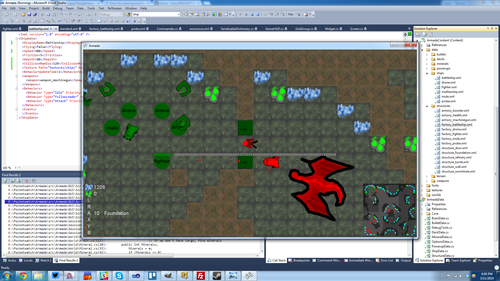Trending
Opinion: How will Project 2025 impact game developers?
The Heritage Foundation's manifesto for the possible next administration could do great harm to many, including large portions of the game development community.

Featured Blog | This community-written post highlights the best of what the game industry has to offer. Read more like it on the Game Developer Blogs or learn how to Submit Your Own Blog Post
I love RTS. But I hate RTS. We’re making an RTS. (it’s codenamed [ARMADA]) We're starting Open Development today!

To follow our Open Development process, follow:
Twitch: twitch.tv/pwgtwitch
Twitter: @PocketwatchG
Facebook: facebook.com/PocketwatchGames
Blog: blog.pocketwatchgames.com
I love RTS. But I hate RTS. We’re making an RTS. (it’s codenamed [ARMADA])
There is no more thrilling moment for me than outsmarting a friendly opponent with Reapers in the back of his base or a repelling a horde of enemies with perfectly placed Tesla Coils.
Maybe it’s just nostalgia speaking, but I want to play an RTS game that feels like a battle of wits, not a battle of clicks. I want to compete at a high level, but I also want to be able to introduce the RTS genre to my friends at a party. I want an RTS where the strategy is creative and complex and the micro is accessible and fun.
With Monaco, we took an old school genre (Stealth), we simplified the controls, and then we built an incredibly complex game that could be played at high and low skill levels alike. I want to do the same with the RTS genre.
[ARMADA] is the simplicity of Monaco injected into a classic RTS.
[ARMADA] is a Real Time Strategy game. You build a base, raise an army, and attack the enemy. Simple, right? Not so fast.
With apologies to those devs who have tried, no one has ever made an RTS that played well on a dual analog gamepad. We’re gonna be the first to do it right.
The game design of [ARMADA] revolves around these two philosophies:
[MENTAL] Everything in the game should feel -- emotionally and intellectually -- like you are playing a traditional RTS like SC2.
[PHYSICAL] All mechanics must be equally fun on dual analog as they are on keyboard/mouse.
Army Control
Unit orders are the first game design casualty in our quest for a great gamepad-RTS.
In [ARMADA] the player controls a Champion who can build structures, lead forces into battle, scout, and fight for herself. Your troops are autonomous but governed by AI that is determined by the unit class. Some troops will be defenders, hanging out near their spawn point. Some troops harvest resources. Some troops are attackers, seeking out the nearest enemy. Most troops will also follow the Champion into battle, allowing you to have a large force of mixed units.
Rock Paper Scissors
RTS revolves around a version of Rock/Paper/Scissors. The initial decision in traditional RTS games is Attack/Defense/Economy. If you rush, someone who turtles wins. If you turtle, the person who fast expands wins. If you fast expand, you are vulnerable to attack. In practice, RTS games are much more complicated than this, but the initial strategic directions can usually be boiled down to those three choices.
In broad terms, the player character in [ARMADA] is the primary attack force, their army is the primary defensive force, and economy management happens in traditional RTS ways.
Competition, Co-op, Replays, Editor, Modding
Yes, [ARMADA] is being built with competition and co-op in mind. We’re only a month into development and we already have a strong networking system built for the basic features, a working replay system, a basic editor, and pretty much all of the game data is in human-readable (and editable) XML format.

I honestly don’t know if [ARMADA] will be another three year project I don’t even know if it will be longer than a 6 month project. Sound kind of familiar? That’s how Monaco started out… as a 6 week XBLIG game.
But I do know that there is a game that I want to play that doesn't exist. Monaco’s success has given us the leeway to make whatever game we want to make next. I hope that our (amazing) community and new people will join us in following along with development. And if I know anything about the internet, you’ll steer us where we go wrong, give us inspiration, and join us in the [ARMADA] community.
-Andy Schatz @andyschatz
Twitter: @PocketwatchG
Facebook: facebook.com/PocketwatchGames
Blog: blog.pocketwatchgames.com
You May Also Like